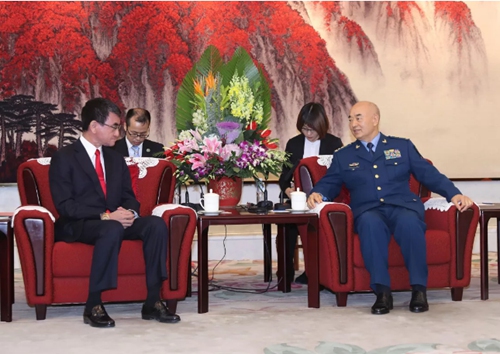HOME >> OPINION
Defense ministers’ meeting signals hope for tepid China-Japan military ties
By Chen Yang Source:Global Times Published: 2019/12/24 17:48:40

Xu Qiliang, vice chairman of China's Central Military Commission meets visiting Japanese Defense Minister Taro Kono. Photo: Courtesy of Ministry of National Defense
According to the Asahi Shimbun, Japanese Defense Minister Taro Kono visited China on December 18 and met Vice Chairman of China's Central Military Commission General Xu Qiliang and Chinese State Councilor and Defense Minister General Wei Fenghe.
Both sides agreed on promoting defense exchanges and deepening mutual understanding. They also reaffirmed the importance of implementing the United Nations Security Council resolution on the Korean Peninsula nuclear issue.
Besides, Kono invited General Wei to have a defense ministerial meeting in Japan next year. After 10 years, this was the first time that the Japanese defense minister paid a visit to China and had meetings with his Chinese counterpart, which indicates an upswing in China-Japan relations.
In June, then Japanese defense minister Takeshi Iwaya met General Wei on the sidelines of the Shangri-La Dialogue. Because of the cabinet reshuffle by Japanese Prime Minister Shinzo Abe in September, the minister was changed to Kono who used to be the Minister for Foreign Affairs.
The meetings between defense ministers of both countries were not only based on the mutual consensus reached by the first half of the year, but they added significance to the improvement in China-Japan relations, especially the increasing defense interactions between the two countries.
For example, a China-Japan maritime and aerial communication mechanism was established between the People's Liberation Army (PLA) Navy and Japan Self-Defense Force (JSDF) in 2018. In April 2019, Japanese frigate participated in the international fleet review held in Qingdao. Also, China-Japan strategic dialogue was resumed this August after a gap of seven years. Additionally, Chinese guided-missile destroyer Taiyuan visited Japan in October.
Defense relationship is the most important component of China-Japan relations. However, compared to education or economic ties, it is harder to strengthen defense relations. Since 2017, even though the communications on defense between the countries have increased, it still can't be compared to the cooperation in economy and education.
The lack of trust in public can be a reason for the slow progress in China-Japan defense relations, such as Japanese media's speculation on China's defense budget and Chinese people's suspicion on Abe's sincerity in improving bilateral relations. The meetings between defense ministers last week marked the establishment of basic trust between Chinese and Japanese governments. But how to pass down the trust to the public is a significant issue.
The defense exchanges between China and Japan started in 1970s, and led to many achievements. After the normalization of China-Japan relations in 1972, Offices of the Defense Attaché were set up in both countries two years later, indicating the beginning of bilateral communication on defense. Also in 1974, the Vice Chief of the General Staff visiting Japan opened the door for high-level defense exchanges between the countries.
Defense relations improved significantly in 1987 when Japan's then minister of defense visited China for the first time. China inviting Japanese military officers to the exercise of Warrior-2007 conducted by motorized infantry division in 2007 also enriched defense exchanges. In November of the same year, the first visit of Chinese guided-missile destroyer to Japan marked a new page in defense relations.
However, even after huge progress, defense exchanges between China and Japan are still in the early stages. For example, there is basically no joint military exercise, training or technology cooperation between PLA and JSDF. The level of China-Japan defense exchanges is even worse than that between Russia and Japan, let alone Japan's defense relations with the US, South Korea and Australia.
Therefore, strengthening bilateral defense exchanges should be the mutual goal of the two countries.
Since China and Japan are major powers in the Asia-Pacific region, expanding and deepening defense exchanges will not only benefit both countries, but also contribute to peace and stability in this area.
China-Japan relations are now moving toward a positive direction in the new era. There has been a good start to bilateral defense exchanges. Both sides should seize the opportunity to explore new ideas on promoting defense cooperation and handling security relations. By doing so, China-Japan ties in the new era will become more consolidated.
The author is a media professional and a Japan observer based in Beijing. opinion@globaltimes.com.cn
Posted in: ASIAN REVIEW